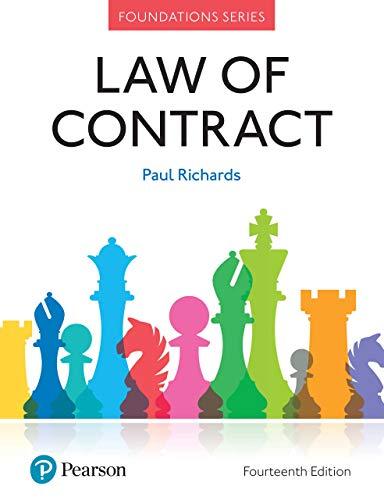Question
Ferguson v. Arizona Properties Several months ago, Colonel Augustus P. Ferguson, who won several medals for bravery in World War I, died at age 104
Ferguson v. Arizona Properties
Several months ago, Colonel Augustus P. Ferguson, who won several medals for bravery in World War I, died at age 104 in the crash of a private plane. His only surviving child is Augustus, Jr. In 1928, the Colonel and his wife executed wills leaving all their property to each other, or in the event the spouse had previously died, in equal shares to their surviving children. His wife passed away in 1977. Shortly after her death, the Colonel became involved with. Arizona Properties, Inc. a land development company. He was vice-president of the company at his death. Before he died, he revoked his 1928 will and executed a new will giving his entire $1.3 million estate to Arizona Properties.
Augustus Jr. has asked your senior attorney to challenge the validity of the second will in probate court. The law in this state reinstates the previous will if the later will is invalid. Junior stated that the Colonel's new attorney, also general counsel for Arizona Properties, drafted the second will. This attorney and the Colonel were both avid fishermen and went fishing together two or three weekends each month. The attorney resigned as general counsel a year ago.
Junior also said that the corporation financed trips for the Colonel, "allegedly for purposes of learning foreign land development strategies," to Hong Kong, Rio de Janeiro, and Cairo. These trips occurred before he revoked the first will. Junior admitted that his father, from whom he was estranged since the death of his mother, "was not at all senile." There are two relevant cases in this state:
In re Estate of Steffans (1962)
This case involves the validity of the will of Maxine Steffans, a real estate broker, who left her entire $385,000 estate to her paperboy for eight years, Rodney Prentice. This court has recently required those challenging a will for undue influence to show (1) susceptibility to undue influence, (2) opportunity to influence, (3) disposition to influence, and (4) coveted result. The court below concluded that no such influence occurred, and we agree.
Mr. Prentice testified without contradiction, and the trial court found as fact, that Steffans spoke to Prentice only when he came to collect the biweekly payment for the paper, .and that she frequently paid him by putting a small envelope under her doormat to avoid this contact. A neighbor also testified that Steffans, who had a reputation as an eccentric, told her that she, Steffans, was willing Prentice her entire estate because he brought the paper on time. Under these circumstances, the claim of undue influence is speculative at best, particularly when the neighbor did not pass this information on to Prentice or anyone else.
In re Will of Kendall (1969)
Harriett Kendall's first will, executed when she was fifty-two, left her entire estate to her husband, Ralph. She entered a nursing home in 1965, when she was eighty-one. Shortly thereafter, she called an attorney to ask some questions about her will. Harriet was bedridden at the time, unable to carry on a conversation for more than several minutes, and prone to forgetfulness.
The attorney made his first visit to the nursing home with Harriet's sister, Mabel. Mabel suggested that she think about writing a new will. On their second visit, about one week later, the attorney and Mabel brought a new will for Harriet to sign. Although she was too weak to sit up to sign it, she was able to mark it with an "X" after Mabel propped her up with some pillows. When Harriet died in early 1966, her husband learned that the second will left her estate to Mabel's only son, Edmund. He also learned that the attorney who 'drafted the second will was not Harriet's personal attorney, but rather was Mabel's attorney. The trial court nonetheless admitted the second will to probate. We reverse.
There are two tests for determining whether there was undue influence in the execution of a will. The first test, described in ln re Estate of Steffans ( 1962), need not be considered here because we find the trial court erred under the second test. Undue influence can occur when there is a confidential relationship between the testator and the one alleged to have exercised undue influence, and there are suspicious circumstances surrounding the making of the will. The existence of a confidential relationship depends on the ease with which the confidant controlled or influenced the drafting of that will. Suspicious circumstances exist when there is a sudden and unexplained change in the attitude of the testator, activity by the beneficiary in procuring the drafting and execution of the will, or similar circumstances. In this situation the activity of the attorney and the beneficiary's mother in procuring a will from an elderly woman meets both requirements.
You are a trial judge assigned to Ferguson v. Arizona Properties. You have heard the case and you will decide the case in one of the following ways:
For the Plaintiff,
For the Defendant, or
Declare the case dismissed.
You must be present to receive credit.
What will be the basis of your decision? Consider the law, the evidence, as well as what's in the best interest of fairness and justice.
Step by Step Solution
There are 3 Steps involved in it
Step: 1

Get Instant Access to Expert-Tailored Solutions
See step-by-step solutions with expert insights and AI powered tools for academic success
Step: 2

Step: 3

Ace Your Homework with AI
Get the answers you need in no time with our AI-driven, step-by-step assistance
Get Started


